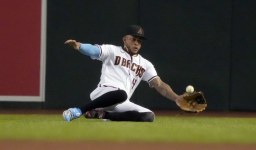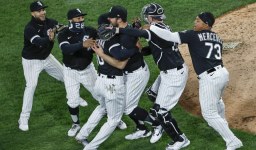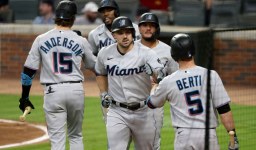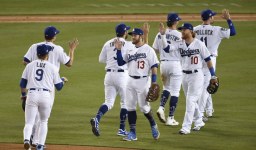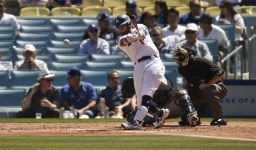As one of the only professional sports leagues in the world currently in action, the Korean Baseball Organization has found itself in the spotlight around the globe, with sports-starved fans watching live broadcasts at odd hours and rooting for adopted teams such as the NC Dinos and Doosan Bears.
For KBO Commissioner Chung Un-chan, bringing the 10-team league onto the international stage has long been a dream, and he said Korean baseball is ready for its closeup.
“I would not have expected [international exposure] to become a reality as early as now,” Chung told UPI during an interview at a baseball-themed bar and restaurant in Seoul called Yanks and Metzz. “But I would say that Korean baseball has already had the potential of being becoming popular to the baseball world. The coronavirus changed things to show that earlier than expected.”
While many countries remain in lockdown, South Korea managed to flatten the curve of the COVID-19 pandemic through aggressive testing and tracing, which allowed the KBO to start playing games in front of empty stadiums on May 5.
Entertaining game style
The live action attracted international broadcasters hungry for content, including ESPN, which is airing six games a week.
Chung said the first thing that will attract international fans is the KBO’s entertaining style of play, one he describes as a hybrid of the American big-ball power game and the small-ball style more commonly found in Japan, where finesse and fundamentals are stressed.
KBO players routinely bunt for base hits but also swing for the fences in fast-paced and traditionally high-scoring contests, and they perform with a flair that is frowned upon in the North American game. Showy bat flips are a signature of the game that has become a social media staple.
“I personally don’t like the bat flips,” Chung acknowledged. “But they seem to be very popular.”
The 73-year-old commissioner, a leading academic who served as South Korea’s prime minister in 2009-10, said the KBO’s electric ballpark experience is another big draw, as games are a non-stop spectacle of cheerleaders, fan-led rally songs and choreographed chants.
“Korea’s cheering culture is a unique part of the game,” he said, adding that representatives from other professional leagues have visited KBO stadiums in recent seasons to take notes.
For now, it remains a side of the KBO that global audiences can’t see. Cheerleaders are present, but games are being played in empty stadiums where chatter from the dugout is the only crowd noise.
Plans for fans
Chung said the league is hoping to bring back fans as soon as possible, with a plan to increase attendance in stages, starting with 25 percent, then moving up to 50 percent and finally full capacity.
The commissioner said that plans were actually in place to introduce fans as early as last week before a new outbreak centered around nightclubs in Seoul put things on hold. The league is closely monitoring the spread of the disease and consulting with health authorities before bringing audiences back.
“You have to make some kind of compromise,” Chung said. “If you are thinking only about coronavirus, you cannot do anything. If you are too quick to make the economy recover, then there could be a problem with the pandemic.”
Team admin-ajax.phps are also eager to start bringing in fan revenue from the games. Chung said the KBO has reduced the fees that the teams pay to the league but the revenue shortfall could be a long-term problem.
“If it continues to be the case where we cannot accept fans, [teams] will be in trouble,” he said. “So now we are figuring out how to make up for the loss, but we don’t have a clear solution yet.”
Details of broadcast rights with ESPN have not been made public. Chung said that viewership through the early part of the season has been on the rise, with local television broadcasts up by around 6 percent on the year and online streaming skyrocketing by more than 400 percent.
Love of baseball
Chung’s role as KBO commissioner is the culmination of a lifelong love affair with baseball. He was introduced to the game as a fourth-grader and early on he thought he might have a future as a player.
After joining an organized team, however, that dream didn’t last long.
“I considered becoming a baseball player, but my coach didn’t recommend it,” Chung said. “He told me: ‘You should study.'”
Chung’s pursuit of academics led him to Princeton University for a Ph.D. in economics in the 1970s and it was here that he fell for the American game, at first following the New York Mets of Tom Seaver and Jerry Koosman then later switching loyalties to the crosstown Yankees.
In fact, Chung said he watched so much baseball, it prevented him from finishing his Ph.D. on time.
“Princeton offered us only a four-year scholarship, but since I watched over 100 baseball games a year, I was not able to finish my dissertation,” he said.
Instead, Chung extended his stay in the United States by applying for a teaching position at Columbia University. At his job interview, he was asked if he felt he knew enough about American culture to teach at the school.
“I asked what [the interviewer] meant, and he said, ‘Do you know Major League Baseball?’,” Chung said. “So I said yes. And for 70 minutes, we talked only about baseball. Seaver, Koosman, [Jerry] Grote, [Reggie] Jackson, Thurman Munson and all of those guys.”
Chung was hired and finished his Ph.D. in 1978 before returning to South Korea.
After the KBO was founded in 1982, he became one of its best-known fans, writing baseball columns and providing radio commentary for games. In 2013, he published an essay titled “An Ode to Baseball,” in which he described baseball as a metaphor for life, and became commissioner in 2018.
Baseball heals
Chung said baseball has long played a healing role in South Korea, where people turn to the game as a relief from the pressures of everyday life and the country’s demanding school and workplace cultures.
“Now we are suffering from the coronavirus, and we can watch baseball to get away from it,” he said. “To an international audience, I hope that it can also be some kind of healing, at least to people who know baseball.”
The KBO’s early efforts in bringing baseball back have also kept the league in close contact with other sports leagues looking to restart their own seasons.
Major League Baseball, which opened a two-person office in Seoul last August, said that it is following the KBO experience closely.
“MLB has a close relationship with the KBO and regularly exchanges information and best practices on a variety of issues,” said Jim Small, senior vice president of MLB International. “This has continued during the challenging situation these past few months. We’re delighted that the KBO is back in the field and wish them continued success. We look forward to a continued strong relationship with them in the future.”
Dan Kurtz, a KBO fan based in Tacoma, Wash. who operates the site MyKBO.net, said the response to Korean baseball in the United States has been “overwhelming.”
“Whether it was from fans missing baseball, live sports, fantasy sports players or it is just a nice morning escape from the pandemic news, I have been pleasantly surprised how many American fans have gained interest in the league,” he said. “What I do hope is that some fans have gotten a taste of the league and want to keep following along or even check in during the post-season.”
Chung, whose term as commissioner is scheduled to end next year, also said he hopes that Korean baseball will be able to keep its place on the global stage. One dream he has is for teams from Northeast Asia, such as Japan, South Korea and Taiwan, to have their own playoffs and then take on the winner of the MLB World Series.
“Why not have a World Series game between the champion of the Northeast Asian league and the champion of the North American league?” he said. “Then it would be a real World Series. I don’t know how long it would take to set it up, but it’s a nice idea.”


